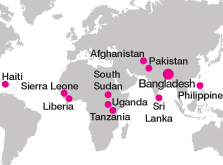New study finds 0.3pc of arable land lost each year
The Daily Star article
15 November 2012
Bangladesh loses 0.3 percent of cultivable land each year due to massive urbanisation, industrialisation and new roads, not the 1 percent long been claimed, according to a recent study.
The country had 9.2 million hectares of farm lands, according to an agriculture census conducted in 1983-84. It came down to 8.2 million hectares in the census of 1996, providing ground for the claim that the country loses 1 percent of cultivable land annually.
But the latest study, which was conducted in 2008 but the results were made available recently, shows an increase in the cultivated land by 0.8 million hectares over the previous census.
Between 1983-84 and 2008, cultivable land decreased at an annual rate of 0.3 percent, said Mahabub Hossain, executive director of BRAC.
"It is an important piece of information, as various issues such as food security hinge on the availability of land," he said, urging the government to conduct a detailed research to find out the amount of land available in the country for agriculture.
The agriculture economist said although policymakers claim that a large swathe of land has been reclaimed recently, the amount is still not visibly significant.
He made the disclosure at a workshop on "Developments in tenancy and credit markets in Bangladesh: implications for agricultural development strategy and policies" at BRAC Centre Inn in the city. BRAC organised the programme.
Hossain said farmers must be given fair prices and some incentives, otherwise they would not feel encouraged to grow enough rice for the consumers in the cities.
The speakers also called for setting up a national commission to supply credible data not only for the farm sector but also for other sectors.
"How can we plan if we do not have effective census data?" Hossain said. "There should be a framework so that we can get credible information."
The food ministry and the agriculture ministry are always at odds over statistics over rice production in the country, said MM Akash, a professor of economics at Dhaka University.
"The food ministry tries to say that there is a shortage in the staple food. So it wants to import to narrow the demand and the supply."
"On the other hand, the agriculture ministry tries to prove that there is enough rice production to meet the national demand. We should set up a national committee to ensure that our political biasness does not become a statistical biasness."
Credible statistics is important for policymakers to guide the country to its desired direction, said MK Mujeri, director general of Bangladesh Institute of Development Studies (BIDS). "It is not only important for the agriculture sector, but also for other sectors."
Hossain of BRAC also said the government should go for targeted input subsidies, instead of a generalised one, so that the real farmers could really benefit from the budget support.
He also said the government will have to keep the agriculture development through technology in its hand as a majority of the country's farmers belong to small and medium categories.
These small and medium farmers may not afford the technology manufactured by the private sector, he said. They also should not be left at the mercy of the nature, he said.
He also said microfinance
organisations will have to introduce short-term loans to cater to small households as 25 percent of the farmers still borrow from the high-cost market.Apart for agriculture, farmers should also be given support in generating income from areas such as livestock and fisheries, he said.
Akash also said the country could go for cooperative farming at least in case of input procurement and output selling, so that they can bargain for their produces.
He also said Bangladesh should try for giving intermediary technologies to the farmers as they will not be able to adopt capital technology in one go.
Mujeri of BIDS said he thinks the current input subsidies for the agriculture sector help the recipients indirectly, not directly.
He said there should be institutions at farmers' level. Otherwise, the country will not be able to take benefit of different farm projects to the target group, he said.
Hossain Zillur Rahman, a former caretaker government adviser, said the government must boost its spending for agriculture to help the sector grow. The government should also develop marketing infrastructure so that farmers' produces get fair prices.
Sajjad Zohir, director of Economic Research Group, a local think-tank, said price support should be given in areas that are the most effective.
A national commission could be set up so that disagreement over statistics does not surface, said Monzur Hossain, senior secretary to the agriculture ministry.
On a section of policymakers' claim over land reclamation, he said about 200 to 300 square miles of land could be reclaimed in the last three decades. The secretary also said the ministry is going to set up a unit, which will give policy support to the ministry.
It is not the fault of the food ministry for the data over rice production and storage, as it gets the information from the statistical division, said Ruhul Amin, a former director general of the food ministry.
Prof Abdul Bayes, a teacher at Jahangirnagar University; Binayak Sen, research director of BIDS; SM Hashemi, a professor of economics and social science at BRAC University; Mohammad Abdul Malek, a research fellow of Research and Evaluation Division (RED) of BRAC; Prof WMH Jaim, director of RED, and Wais Kabir, executive chairman of Bangladesh Agricultural Research Council, also spoke.
This article was originally posted here: http://www.thedailystar.net/newDesign/news-details.php?nid=257516







Connect With Us